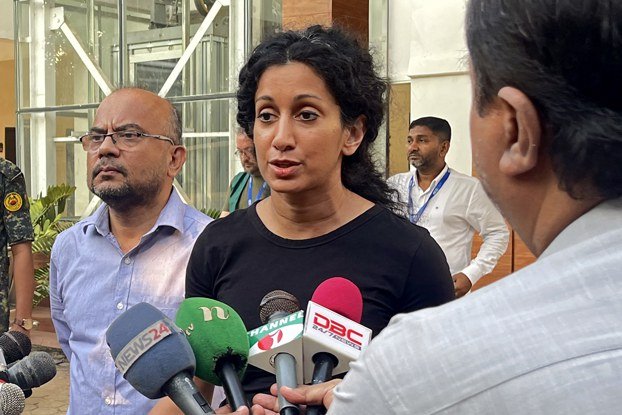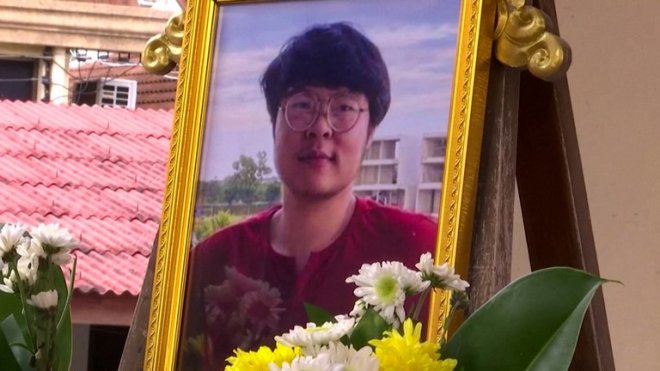Fate of Uyghur miners trapped in gold mine collapse uncertain after nearly 2 weeks
The fate of 18 miners – mostly Uyghurs – trapped in a collapsed gold mine in China’s far-western Xinjiang province remained uncertain, officials said, implying that rescuers have failed to pull any of them out alive nearly two weeks after the Christmas Eve disaster.“I know that the rescue operation is going on, but I don’t know the result of the rescue efforts,” said an employee of West Gold Yili Co., which owns the mine in Qarayaghach town of Ghulja county, or Yining in Chinese. He insisted on not being identified by name.
An employee at the Xinjiang Uygur Autonomous Region Emergency Relief Supervision Command Center said the rescue operations were ongoing and that two of the center’s leaders went to the site of the accident the day it occurred, Dec. 24.
“The fate of those trapped in the mine [and] the responsibility for the incident are confidential information,” he told Radio Free Asia, also requesting anonymity. “These aren"t the questions we have answers to. It is not yet time to ask about responsibility for the incident.”
When asked about the number of people participating in the rescue operation, he said he was not allowed to make the information public.
Of the 40 miners working underground at the time of the accident, 22 were safely rescued.
Chinese authorities in Ghulja have not issued any updates about ongoing efforts to extricate the miners, and the reason for the collapse remains unknown.
So far, they have held only one press conference about the accident, though it highlighted the participation of relevant organizations and leaders in the rescue operations. During the news conference, authorities did not disclose the cause of the mine collapse, who was responsible, or the identities of those still trapped underground.
RFA learned earlier that most of the 18 workers underground were mostly Uyghurs from government organizations in Ghulja county, where the mine company is located.
Likely dead
Chinese authorities have cracked down on unsafe mining practices and levied harsher penalties for violations across the country in recent years, though cave-ins still occur where safety measures are slipshod, especially at makeshift or far-flung mining sites.
Mine collapses are usually caused by large amounts of water erupting underground at the mining site or by the failure of weak structural material supporting tunnel roofs of tunnels, said a Uyghur mine expert, who requested anonymity for safety reasons.
The trapped miners could likely survive only three to five days underground, he said.
“If there is no information for 10 days regarding the 18 trapped miners, then it is most likely these miners are not alive anymore,” the expert told RFA earlier this week.
“If miraculously they were not injured due to the mine collapse, the air ventilation wasn’t blocked, and no poisonous gas was released, then they would still die of lack of water and food in a week,” he said.
Another officer at the command center said he did not know how many more days the rescue operations would continue.
“We are not responsible for information and propaganda,” he said.
“Even if we know, we can"t tell you what we know. There are parts of this matter that are disclosed to the public, and parts that are not disclosed. We can only say that the rescue operation is still going on,” he added.
An employee at the Ghulja County Petition Bureau said relatives of workers still in the mine have not contacted the office.
“We have not yet received a complaint from the family of those who were under the mine,” the employee said. “We heard from the community that most of the 18 people were Uyghurs, including teenagers, but we were not informed about this in official meetings.”
Elfidar Hanim, president of the Uyghur American Association, expressed concern about the fate of the trapped miners.
“Such events and subsequent rescue efforts should have been reported live on site, but the Chinese authorities are not doing this,” he told RFA.
Chinese authorities are protecting their reputation and the failure of their system by placing themselves above public safety, Hanim said.
“Since most trapped miners are Uyghurs, authorities want to deal with this tragedy discreetly,” he added.
Translated by Mamatjan Juma for RFA Uyghur Written in English by Roseanne Gerin. Edited by Malcolm Foster.
[圖擷取自網路,如有疑問請私訊]
|
本篇 |
不想錯過? 請追蹤FB專頁! |
| 喜歡這篇嗎?快分享吧! |
相關文章
AsianNewsCast























